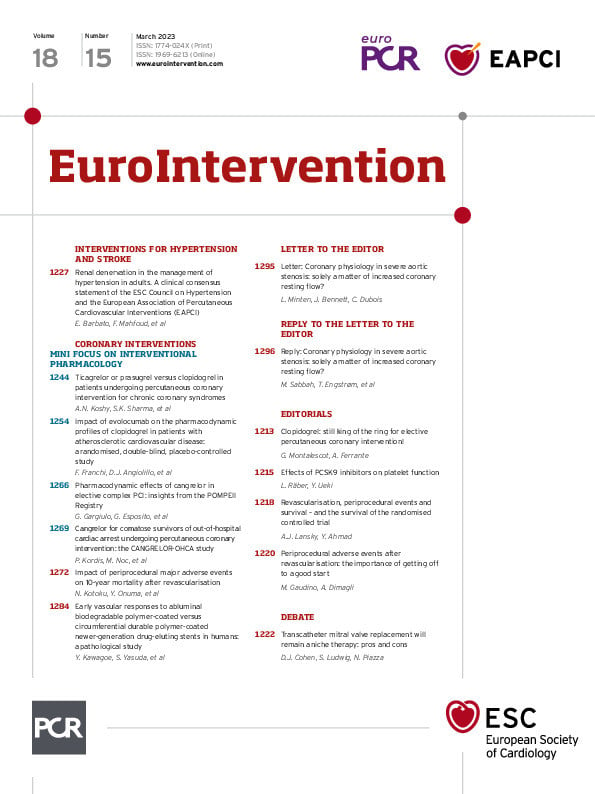In this issue of EuroIntervention, Kotoku and colleagues present the most systematic and thorough assessment of periprocedural major adverse events (PMAEs) after coronary revascularisation to date, with their analysis from the Synergy between PCI with Taxus and Cardiac Surgery (SYNTAX) trial4. PMAEs were defined broadly as a composite of myocardial infarction (either spontaneous or periprocedural), stroke (either ischaemic or haemorrhagic), repeat revascularisation (either surgical or percutaneous), major infection, stent thrombosis, graft occlusion, bleeding, major arrhythmia, heart failure, acute respiratory failure, acute renal failure, or wound dehiscence. These non-fatal events were truncated at 30 days to define the procedural relationship. The major findings of the study are as follows: (1) PMAEs were more common after CABG than after PCI (28.2% vs 11.2%; p<0.001); (2) patients who suffered a PMAE had higher mortality in the first year than those who did not, whether they had been treated by PCI or CABG; (3) this impact of PMAEs on mortality receded during longer-term follow-up; however, patients with ≥2 adverse events did have an increased 10-year all-cause mortality. The analysis also suggests that the mortality hazard can be significantly improved by optimal medical therapy, with patients on ≥3 prognostic therapies (i.e., a statin, at least 1 antiplatelet drug, a beta blocker, and an angiotensin-converting enzyme inhibitor/angiotensin receptor blocker) having lower mortality than those on ≤2, although this relationship understandably also exists, albeit less pronounced, for patients who have not suffered a PMAE.
The authors should be commended for an eye-opening look at the long-term implications of periprocedural complications following revascularisation of patients with left main or 3-vessel coronary disease. Beyond the headline findings, this analysis will be a turning point in our approach to risk-stratifying patients following revascularisation due to the inclusion of PMAEs in our calculus. Importantly, patients with PMAEs appear to have a stronger prediction for mortality at 1 year following CABG (adjusted hazard ratio [HR] 9.99) than following PCI (adjusted HR 3.42) despite similar between-group absolute mortality rates; this warrants closer follow-up and medical therapy. The fact that optimal medical therapy with ≥3 guideline-directed medications had a dramatic 82% independent reduction in all-cause mortality at 1 year among PMAE patients that was not seen in non-PMAE patients also helps guide our clinical practice to identify those at greatest risk and those who would get the greatest benefit from intensified therapy. Beyond offering actionable measures to reduce long-term events among patients with PMAEs, this analysis also allows us to understand some of the predictors of PMAEs. Age, renal dysfunction, and the EuroSCORE predicted the occurrence of PMAEs after both PCI and CABG, whereas peripheral vascular disease predicted the occurrence of PMAEs after CABG only; it is no surprise that optimising medical therapy would have a greater benefit among PMAE patients who concurrently had more risk factors.
One of the challenges of the study is the use of the broadly inclusive composite endpoint to define PMAEs in predicting subsequent mortality. For example, including wound dehiscence in the composite will necessarily affect groups differently (in this case CABG) and may contribute differently to the subsequent mortality risk. Nonetheless, it is important to capture the impact of all these adverse events, as their occurrence will inform the clinical course and prognosis of patients after both revascularisation strategies.
Another important aspect of this analysis is to underline that the occurrence of a post-procedural complication disrupts the accuracy of preprocedural risk scores based on the individual patient baseline risk profile. When based on the SYNTAX II score 2020, the occurrence of PMAEs will substantially alter the predicted and observed mortalities, underestimating the PMAE patient’s mortality risk at 10 years. This should be considered when counselling patients of their risk before revascularisation and emphasises the importance of trying to predict which patients are at an increased risk of adverse events. If a fuller understanding of a patient’s likely prognosis after revascularisation can be gained, we can better inform therapeutic decision-making. Ultimately, a patient’s long-term mortality risk should be reassessed at 30 days following revascularisation, as the occurrence of PMAEs further informs prognosis and provides actionable intensification of medical therapy to improve outcomes.
The time-dependent relationship of PMAEs to mortality should be interpreted cautiously. Although PMAEs only predicted all-cause mortality at 1 year and not longer-term, early mortality remains meaningful, and multiple PMAEs do appear to impact long-term mortality. Competing causes of death entirely unrelated to the index procedure are reasonably expected to assume greater significance after 5 or 10 years, particularly in an elderly patient population, and long-term effects on cardiovascular mortality may be more relevant to evaluate in future studies5.
Perhaps the most striking aspect of this study is that it underscores the value of the traditional large-scale RCT. The SYNTAX trial was initially published in 2009. Now, 14 years later, there are still analyses, such as that from Kotoku and colleagues, which provide meaningful contributions that enrich our understanding of our field. Such granularity is only possible within the framework of a robust, appropriately sized and resourced RCT. In the current resource-constrained era, with an increasing emphasis on randomised registries and lean case report forms intended to streamline trial processes and improve cost-efficiency, we should all pause to take stock of what we might be sacrificing.
Conflict of interest statement
The authors have no conflicts of interest to declare.

